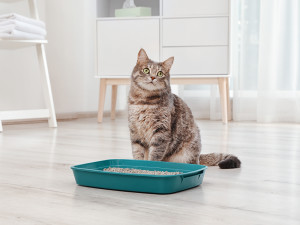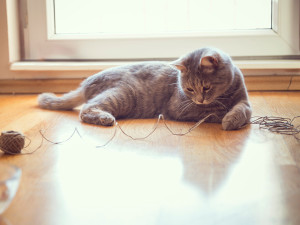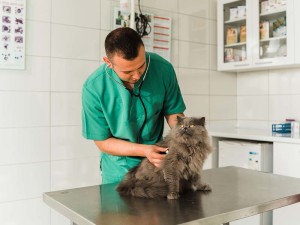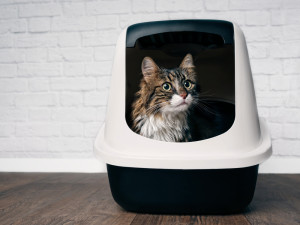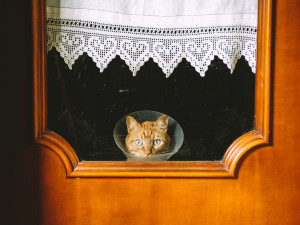Why Is My Cat Bleeding From Their Anus?
It’s not a pretty problem to have, but it’s important to know how to treat this condition.
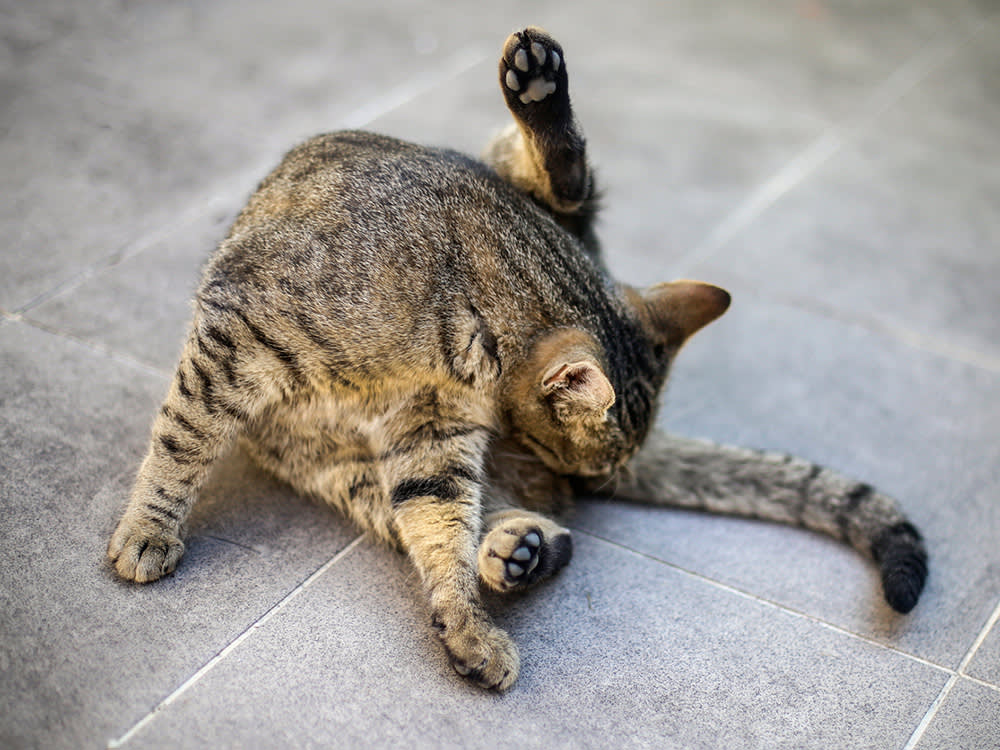
share article
There are various potential causes of rectal bleeding in cats, including anal sac disease, growths, constipation, parasites, physical trauma, perianal fistula, and rectal strictures. Promptly seek veterinary attention if there is significant bleeding observed. Early diagnosis and appropriate treatment is vital for ensuring the cat’s wellbeing.
What are the signs my cat is bleeding from their anus?
Discovering that your cat has bleeding from their rear-end can be alarming for any cat parent. This realization may be from finding spots of blood in various areas of the home. A cat may also lift their tail or constantly groom their hindend, drawing attention to the problem area. The signs of a bleeding anus in a cat can include:
Blood on the anus or under the tail
Blood on the floor or bedding
Blood in the litter box
Changes in litter box habits (avoidance or excessive visits)
Excessively grooming the hind end
Swelling at or near the rectum
Pain (hiding, vocalizing, or walking gingerly)
What are the potential causes of a bleeding anus in cats?
Finding blood near a cat’s anus doesn’t mean that the blood is coming from the anus. Bleeding can originate externally from the anus or anal glands or internally from the rectum or another section of the gastrointestinal tract. The causes of a bleeding anus in a cat include:
Anal sac disease
Cat anal sacs, commonly called anal glandsopens in a new tab, are two pea-sized sacs that sit on either side of a cat’s anus at the 4 o’clock and 8 o’clock positions. The sacs fill with thick, greasy, smelly fluid that is expelled during bowel movements. Occasionally, the sacs become impacted, which can lead to infection, abscess formation, and rupture. An infected or ruptured anal sac can leak bloody fluid.
Constipation
A cat who is constipated will have difficulty pooping and may produce dry, rock-hard stool. Constipated catsopens in a new tab will often posture and strain to defecate. The poop that is able to pass may be firm and jagged, causing tiny tears on its way out. This trauma may result in streaks of blood on the stool or a small amount of bleeding from the rectum.
Parasites
Intestinal parasites, like hookworms, roundworms, whipworms, tapewormsopens in a new tab, and giardia, can cause a great deal of inflammation in the intestines, leading to bleeding. This is especially true in instances of hookworm and tapeworm infestations, where adult worms attach to the intestinal walls.
Polyps
Cats can develop polyps (abnormal tissue growths) in their intestines, though this is not a common occurrence. When a cat develops an intestinal polyp, it tends to grow in the small intestines, though rectal polyps can also occur. Intestinal or rectal polyps can be disturbed and irritated by intestinal content, leading to bleeding. Luckily, these growths tend to be benign.
Inflammatory bowel disease
Inflammatory bowel disease (IBD) in cats leads to chronic inflammation, irritation, and thickening of the intestinal walls. Cats with IBD will develop chronic vomitingopens in a new tab, diarrhea, and weight loss due to poor nutrient absorption. When a cat with IBD has a flare up, they may have bouts of bloody stool.
Cancer
Cancer can affect catsopens in a new tab in many ways, and the gut is no exception. Lymphoma is malignant — meaning it can spread to other parts of the body — and is the most common type of intestinal cancer in cats. There is some overlap in symptoms seen between cats with intestinal lymphoma and cats with IBD, including blood in the stool.
Linear foreign body
Although cats can develop gastrointestinal obstructionopens in a new tab from eating a variety of objects, obstructions from linear foreign bodies are concerning because of the trauma they cause to the intestines. When a cat eats a linear object, like shoelaces or ribbon, that object will create a lot of friction on the intestinal walls, which can cause irritation and bleeding. Don’t let your cat play with or eat string.
Perianal fistula
A perianal fistula is a hole (fistula) near the anus (perianal). These holes are often extremely painful, ulcerated, and form draining tracts that can leak blood-tinged fluid. Luckily, perianal fistulas are rare in cats.
Rectal stricture
A rectal stricture is a narrowing of the rectum — the last segment of the large intestines that separates the colon from the anus. Cats can develop rectal strictures from chronic inflammation, scar tissue after trauma, or from congenital abnormalities. Passage of normal, formed stool can cause small tears in the stricture, causing bleeding.
Trauma/toxicity
Cats do stuff they shouldn’t be doing all the time. This includes ridiculous acrobatics and eating inappropriate thingsopens in a new tab. Sometimes, these activities can lead to injuries of or near the anus. In the case of toxicities, ingestion of certain types of rat bait can cause abnormal bleeding in cats. This can manifest in a number of different ways, including bloody stool or bleeding from the anus.
A note about male cats: Blood from the urethra can sometimes look like it’s coming from the anus. In male cats, the anus and the urethra are only about two centimeters apart, meaning blood found under the tail (or in the litter box) should be investigated closely to make sure it’s not coming from the cat’s urinary opening. Blood from the urethra could be a symptom of urethral obstruction — a medical emergency where cats are not able to urinate. This is primarily a condition seen in male cats, so if blood is found under the tail (or in the litter box) of a male cat, make sure that cat can pee. If you’re not sure, contact a veterinarian for further advice.
How common is bleeding from the anus in cats?
Cats can develop bleeding from the anus as a consequence of common issues, such as intestinal parasites, but bleeding from the rectum is not considered common or normal. While blood from or near the anus doesn’t automatically equal a medical emergency, the possible causes range in severity from benign to serious, so the symptom should not be ignored.
What are the treatment options for bleeding anus in cats?
Identifying the underlying cause is important to determine the most effective treatment of bleeding anus in a cat. If a cat parent brings their cat to the vet with a complaint of a bleeding anus, the vet will start with getting a thorough history and performing a physical exam, which will include inspection of the area of concern. Diagnostics, such as a fecal exam or blood work, may be performed to check for intestinal parasites and evidence of systemic disease or significant blood loss. In some cases, imaging, such as radiographs, ultrasound, endoscopy, or colonoscopy may be necessary.
Treatment for a bleeding anus in a cat can range from medication to surgical intervention, depending on the cause. For example, treatment for bloody stool from intestinal parasites involves deworming. Constipation often calls for rehydration, enemas, and treatment of any complicating factors. Ruptured anal gland abscesses, rectal strictures, and perianal fistulas require procedures that often involve sedation or anesthesia. Vets may recommend surgery in cases of intestinal tumors or severe constipation.
Can I prevent my cat’s anus from bleeding?
There’s no one method of prevention of bleeding anus in a cat. Ensuring appropriate daily care, routine preventative care, and veterinary attention when necessary is the best thing that cat parents can do. Make sure your can eats a proper diet and always has access to fresh water. Keep the litter boxopens in a new tab clean and in an area that’s stress free. Stay on top of vaccinationsopens in a new tab and monthly preventatives. If your cat seems like it’s not doing well, seek veterinary advice.
FAQs (People also ask):
What should I do if my cat is bleeding from the anus?
If your cat is bleeding from their anus, you should seek veterinary advice. Try to be prepared to answer questions about your cat’s recent food and water intake, bathroom habits, and activity level.
Can a bleeding anus be a sign of a serious disease, like cancer?
A cat bleeding from their anus could be a sign of a serious intestinal disease, including cancer, but that is not the only possible cause. Seeking veterinary care to determine the cause is the best course of action.
Is it possible for a bleeding anus to resolve on its own?
Sometimes, bleeding from the anus can resolve on its own, but cat parents shouldn’t count on this happening. Bleeding from the anus is never considered normal, so it’s best to seek veterinary advice.
Are there any home remedies for cats bleeding from their anus?
There are no specific home remedies for a cat bleeding from their anus. Depending on the cause, some veterinarians may recommend a diet change or adjustments to litter box access.
References:

Dr. Alycia Washington, DVM, MS
Alycia Washington, DVM, is a small animal emergency veterinarian based in North Carolina. She works as a relief veterinarianopens in a new tab and provides services to numerous emergency and specialty hospitals. Dr. Washington is also a children’s book author and freelance writer with a focus on veterinary medicine. She has a special fondness for turtles, honey bees, and penguins — none of which she treats. In her free time, Dr. Washington enjoys travel, good food, and good enough coffee.
Related articles
![brown cat in grass]() opens in a new tab
opens in a new tabHairballs: A Tangled Web
What to do when your cat hawks one up.
![White Persian cat on a blue background]() opens in a new tab
opens in a new tabUTIs Suck for Your Cat, Too
Here’s how to help them get relief.
![a cat peeks out of a litter box lid]() opens in a new tab
opens in a new tab5 Litter Boxes Your Cat Likely Won’t Reject
Think like a cat when choosing a litter box...so you can go back to not thinking about litter boxes.
![Uncomfortable looking gray cat sitting on a window sill]() opens in a new tab
opens in a new tabShould Your Cat Go to the ER?
Here are six good reasons to haul tail to the emergency room.
![cat with cone after vet visit]() opens in a new tab
opens in a new tabDoctor’s Orders: Cat Vet Visits Are Essential
Get thy cat to a vet, even if it’s a struggle to get them out the door.
![grey and white cat with tongue sticking out]() opens in a new tab
opens in a new tabWhy Does My Cat Keep Throwing Up?
Here’s when you should worry.
